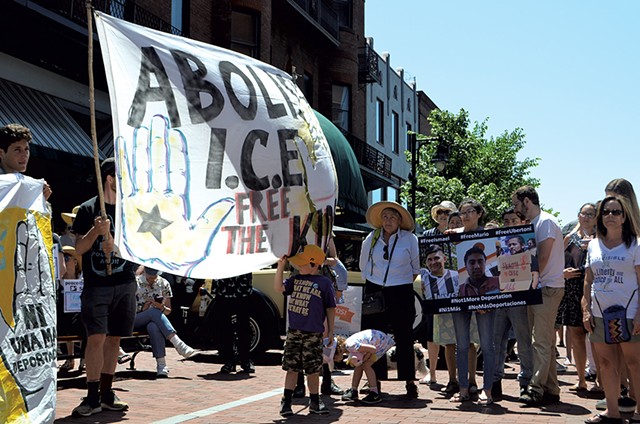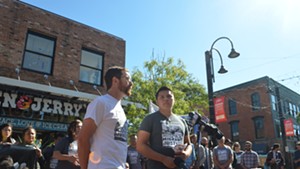
- Derek Brower
- The July 2 rally on Church Street
Zully Palacios stood out at the July 2 rally on Burlington's Church Street that drew hundreds to protest the Trump administration's child internment centers in the Southwest. Her sign showed the faces of local victims of the crackdown on illegal immigration: three Vermont dairy workers who had been arrested last month after shopping at Walmart.
"As we read about what's happening on the southern border, we must not forget what's happening here, on the northern border," Palacios, a spokesperson for Migrant Justice who herself faces possible deportation, told the crowd through a Spanish interpreter.
"These three members of our community were going about their lives, fulfilling their daily needs, shopping for food, sending money to their families in Mexico," she said. "For that, they were detained and now find themselves behind bars."
While undocumented farmworkers have been arrested in Vermont for years, federal data suggest that border enforcement has intensified under President Donald Trump. Even a trip to the supermarket can lead to arrest, sometimes simply because a fellow shopper reports a brown person who they believe looks suspicious or out of place. Newly published research reveals how news of each crackdown ripples throughout Vermont dairy farms, creating an environment where the estimated 1,500 migrant farmworkers struggle to feed themselves because a trip to buy groceries might land them in jail.
According to Migrant Justice, that's what happened on June 23 when a friend drove Ismael Mendez-Lopez, Mario Diaz-Aguilar and Ubertoni Aguilar-Montero from a nearby dairy farm to the Derby Walmart to shop and wire money to family in Mexico. A U.S. Border Patrol agent in an unmarked car spoke to them briefly in the parking lot, then followed them as they left. The agent later stopped the car and arrested the three men, who did not have immigration paperwork. The dairy workers are being held in a New Hampshire county jail under U.S. Immigration and Customs Enforcement custody pending deportation proceedings.
A Border Patrol spokesperson said agents arrested the trio "based on information from a concerned citizen." In arrest records, an agent wrote that the tipster reported "suspicious activity at a Walmart, possibly involving an illegal alien," according to Migrant Justice.
Last month's arrests are strikingly similar to one at the same Walmart last year, in which agents also said they confronted a farmworker based on a tip from a "concerned citizen," Migrant Justice spokesperson Will Lambek said. At least seven undocumented farmworkers have been arrested outside Derby's Walmart Supercenter since February 2018, he said.
Details about immigration court cases are not public, and Seven Days was not able to independently verify the arrest records Lambek referenced. A narrative of a third arrest at that Walmart in August 2018 is publicly available, however, because one of the three men apprehended was charged with the criminal offense of unlawful reentry.
Charging documents filed in U.S. District Court state that Border Patrol agents were investigating a recent human smuggling event when they followed a car carrying Rafael Ribon and two other undocumented workers to a Derby grocery store, which Lambek confirmed was Shaw's. An agent entered the store to confirm that Ribon was among the men. Border Patrol tailed the men as their driver, a U.S. citizen, took them to the nearby Walmart, and agents arrested the group in the parking lot.
Ribon told agents he'd reentered the U.S. five years earlier by wading across the Rio Grande.
Border Patrol uses both citizen-tipsters who call a toll-free line as well as confidential informants to help apprehend undocumented immigrants in Vermont. Boston-based immigration attorney Matt Cameron, who has represented Palacios and other clients arrested in Vermont, said he's seen cases in which Border Patrol has conflated the two in court records, referring to informants as "concerned citizens."
Migrant Justice alleged in a pending civil lawsuit that immigration authorities have targeted activists for deportation and used an informant to infiltrate the group. The men arrested in June have participated in Migrant Justice events.
Confirmed cases of citizen-tipsters do exist. In May, two Mexican men were arrested in Highgate after a "concerned citizen called to report that two Hispanic males had approached her and asked for directions to the bus station," according to federal court records. Vermont agents also question people they happen upon during patrols, as in May 2018, when an agent stopped a flatbed truck near Richford because the passenger pulled a hood over his face and "abruptly looked away."
The primary job of Border Patrol agents in Vermont is to protect the northern border, but a significant number of the undocumented immigrants they arrest didn't cross from Canada. Border Patrol in the Swanton sector, which also includes New Hampshire and part of New York, arrested nearly 400 people thought to have entered the U.S. from the southwestern border between 2013 and 2017, according to a U.S. Government Accountability Office report released in June.
"Customs and Border Patrol is acting a lot like the way people think ICE acts," said Cameron. "The CBP is doing random searches, random sweeps."
Cameron said the Vermont cases he sees in federal immigration court in Boston are particularly unsettling because the arrest reports illustrate how Border Patrol enforcement interferes in Vermont communities, dedicating resources to investigate immigrants with no criminal records.
"It seems to me that they don't have enough to do," he said.
Border Patrol regional spokesperson Michael McCarthy disputed that characterization, noting that the agency is on pace to double the numbers of apprehensions in the Swanton sector for 2019, with "the vast majority" entering illegally from Canada.
"U.S. Border Patrol relies on information and tips from the public precisely because we do not have the resources necessary to stop every illegal border activity," he said in an emailed statement.
But each arrest of a Vermont farmworker, many of whom have lived and worked in the state for years, sends a grim message to the entire migrant worker community: If you leave the farm, you risk deportation.
The word for the cloud of fear hanging over Vermont farms is encerrado, which translates as confined, trapped or enclosed. Teresa Mares, an associate professor of anthropology at the University of Vermont, studied how encerrado leads to food insecurity for Vermont farmworkers in her April book, Life on the Other Border: Farmworkers and Food Justice in Vermont.
Using standard federal surveys, Mares said, she found that 18 percent of Vermont's migrant farmworkers would be considered food insecure, meaning they lack reliable access to adequate nutrition, compared to 10 to 14 percent for Vermonters generally. But that income-based formula failed to capture the additional barriers migrant workers face to accessing food, she found.
Fear of Border Patrol, Mares said, dissuades most Vermont farmworkers, even those with personal vehicles, from leaving their homes. "By and large, especially in border counties, people are not necessarily doing their own grocery shopping," she said.
Instead, they rely on their employers to shop for them using poorly translated lists, or have groceries delivered once or twice a month at a markup. As a result, Vermont's dairy workers eat fewer fresh foods and often lack the ingredients to make comfort dishes from home.
"It's this big sort of contradiction that, in general, we have individuals who are providing our food security," Mares said, "and they themselves are having challenges accessing food."
Mares said she spoke to a woman whose son was detained at a Vermont Walmart before Trump took office, and her book describes a man who was arrested while shopping for items to throw a birthday party for his younger brother. Word of those incidents travels fast between farms and counties.
"Any time there's these loud proclamations about how there's going to be a large rounding up, it piques people's fear. Or if three people are detained at a Walmart in Vermont, that piques people's fear," Mares said.
Migrant Justice has collected more than 1,100 signatures that will be delivered to whichever immigration judge oversees Mendez-Lopez, Diaz-Aguilar and Aguilar-Montero's cases. If they're ultimately released on bond, they could return to Vermont until their deportation case plays out — a process that can take one to two years.
Ironically, while the limbo of a deportation proceeding creates new anxieties, it can also bring a temporary reprieve from encerrado. In her book, Mares relates an interview with a man who was arrested by ICE agents after a local cop pulled over his boss' truck for having an expired registration. The man was released in advance of his court hearing. Since he couldn't be arrested again on the same charge, he felt freer to venture off the farm, Mares wrote.
"Ahora, tengo mis papeles," he joked to the researcher. "Now, I have my papers."














Comments (7)
Showing 1-7 of 7
Comments are closed.
From 2014-2020, Seven Days allowed readers to comment on all stories posted on our website. While we've appreciated the suggestions and insights, right now Seven Days is prioritizing our core mission — producing high-quality, responsible local journalism — over moderating online debates between readers.
To criticize, correct or praise our reporting, please send us a letter to the editor or send us a tip. We’ll check it out and report the results.
Online comments may return when we have better tech tools for managing them. Thanks for reading.